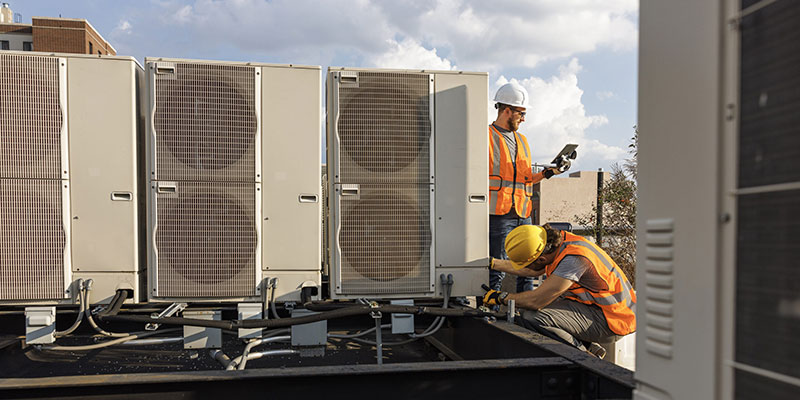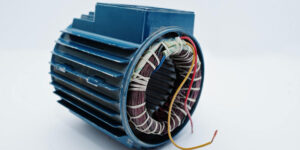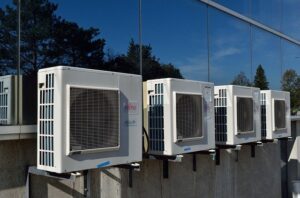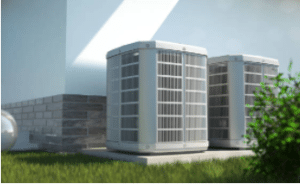Maintaining your commercial HVAC system is like tending to a valuable asset. It’s not just about keeping things running smoothly; it’s about managing costs effectively. By investing in regular upkeep, you can avoid unexpected financial shocks and ensure your energy bills stay in check. Don’t cut corners—prioritize preventive maintenance to keep your business comfortable and your budget balanced.
Overview of Average Maintenance Expenses for Commercial HVAC
Keeping your commercial building’s HVAC system running smoothly is crucial for occupant comfort and avoiding budget surprises. While regular maintenance is an essential investment, many business owners wonder about the typical costs involved.
The good news is that proactive maintenance plans can actually save you money in the long run. Studies show that commercial buildings typically budget around $1,700 annually for preventative HVAC maintenance. This cost covers technician labor, routine inspections, and minor adjustments to keep your system operating efficiently.
By catching small issues early, you can prevent costly repairs, breakdowns, and even entire system replacements down the road. Regular maintenance also ensures optimal system efficiency, potentially reducing your energy bills. Ready to learn more about specific maintenance tasks and how to save on costs? Keep reading for a deeper dive into the world of commercial HVAC maintenance!
Managing Your HVAC Budget: Key Cost Factors
Effective commercial HVAC maintenance involves understanding critical cost drivers. Here’s what matters:
- System Size and Complexity:
-
-
- Larger systems demand more resources and time for upkeep.
- Complex designs require specialized attention.
-
- Maintenance Type and Frequency:
-
-
- Regular check-ups prevent costly breakdowns.
- Tailor maintenance to your system’s needs.
-
- Geographic Location:
-
-
- Extreme climates impact HVAC performance.
- Adjust budgets for harsh weather regions.
-
- Predictive Maintenance:
-
- Invest wisely to avoid surprises.
- Analyze data and address issues proactively.
Remember, strategic maintenance pays off in longevity and efficiency.
Must Read Blog: Commercial HVAC Services for Facilities in Louisville KY
Regular Services
Regular maintenance is key to keeping your HVAC system running smoothly and avoiding costly surprises. Predictive maintenance can also be included, helping identify potential problems before they become emergencies. By investing in routine services, you can save money in the long run. Here’s how:
- Scheduled Check-ups: Regular check-ups help prevent costly emergency repairs. These visits include changing filters, cleaning coils, and inspecting belts. Think of it as a health check for your HVAC system.
- Extend Equipment Life: Just like regular exercise keeps you healthy, routine maintenance extends the life of your HVAC equipment. It’s like giving your system a longer lease on life.
- Calibration Matters: Properly calibrated thermostats and controls optimize performance. It’s like fine-tuning an instrument for the best sound.
Remember, a well-maintained HVAC system not only keeps your facility comfortable but also saves you money. So, consider these services an investment in both comfort and cost savings!
Unexpected Repairs
Prepare for unexpected repairs in commercial HVAC systems by budgeting for maintenance and emergencies. Costs vary depending on the issue, with compressor replacements being more expensive than thermostat repairs. Avoid disruptions to operations and finances by planning ahead.
Average Maintenance & Replacement Costs
Maintaining commercial HVAC systems can incur expenses ranging from $450 to $1000 per truck roll, excluding parts. Surprisingly, 25% of service calls necessitate a return visit, leading to unforeseen costs. Neglecting regular upkeep may result in a complete system replacement, costing an average of $6,000 for a unit serving a 1,000 sq/ft space. Factors like building size, climate, and system type heavily influence replacement expenses. Facility managers should budget for potential maintenance and replacement costs to ensure optimal HVAC performance and avoid financial surprises down the line.
Types of Maintenance for HVAC System
Maintaining your HVAC system is crucial for keeping your building systems running smoothly. There are three main types of maintenance that facility managers can use to address HVAC issues: preventative, reactive, and predictive.
Preventative maintenance involves scheduled upkeep to prevent major issues from occurring. Reactive maintenance is done after equipment has already broken down to restore it to normal functioning. Predictive maintenance, on the other hand, involves using monitoring tools to track performance and address problems before they escalate.
Reactive maintenance can be costly and disrupt operations, leading to discomfort for employees and customers. In contrast, predictive maintenance is a cost-effective approach, saving money compared to preventative and reactive methods. By addressing issues proactively, predictive maintenance helps extend the lifespan of equipment and avoid the need for costly replacements. Prioritizing predictive maintenance can improve efficiency, reduce downtime, and ultimately save you time and money in the long run.
Common HVAC Problems
Effective maintenance and predictive measures can minimize common issues in commercial HVAC systems. Prioritizing prevention reduces maintenance costs.
Regular maintenance of air filters and coils is crucial to prevent dirt buildup, which can lead to system malfunctions and fan failure. Additionally, thermostat malfunctions often occur due to incorrect settings or manual adjustments, impacting the building’s temperature control.
Proper air balancing is essential for commercial HVAC systems to ensure efficient airflow into rooms, avoiding discomfort for patrons and reducing unnecessary strain on your budget. Refrigerant problems can also arise, resulting in a lack of cold air circulation. Low refrigerant levels may require a professional technician to recharge the system, while leaks necessitate locating and repairing the leak before recharging to manufacturer standards.
Issues with sensor malfunction can disrupt HVAC performance, as these sensors monitor air temperature entering the evaporative coil. If these sensors break, the system may cycle continuously or cease functioning altogether. Addressing these common HVAC problems promptly can help maintain a comfortable environment and prevent costly repairs in the future.
Top 4 Key Factors Influencing HVAC Maintenance Pricing
System Size
When it comes to HVAC maintenance pricing, the size of the system is a significant factor. Larger commercial HVAC systems, like those in malls, require more time and resources to maintain compared to smaller office units. The complexity and coverage area of a system influence maintenance costs.
Unit Age
Unit age plays a crucial role in determining HVAC maintenance costs. When it comes to HVAC systems, older units demand more attention during maintenance visits. Their outdated parts can be harder to find and more expensive to replace. If your unit has been running for a decade, expect higher maintenance fees due to wear and tear. Regular upkeep is essential to prevent frequent repairs and ensure optimal performance. Remember, investing in maintenance now can save you money in the long run!
Also Check: Industrial HVAC Services in Louisville
Service Frequency
The more frequent your HVAC maintenance check-ups, the higher the annual expense. While bi-annual servicing is common, some facilities opt for quarterly visits for added peace of mind. Finding the right balance between cost and preventative care is key.
Contract Terms
HVAC maintenance contracts can significantly impact your long-term costs. Some contracts offer comprehensive coverage, while others charge extra for specific services or parts. While a contract with all-inclusive services may seem expensive upfront, it can prevent costly repairs down the line, potentially saving you money in the long run.
The Role of Preventative Maintenance in Cost Management
Regular Inspections
Keeping your HVAC system running smoothly requires regular inspections. By scheduling check-ups, you can catch issues early, preventing minor problems from snowballing into major expenses. During these inspections, technicians identify signs of wear and tear, such as a worn HVAC belt or a clogged filter. Addressing these small issues promptly ensures efficient system performance and avoids hefty repair bills down the line. Remember, proactive maintenance pays off!
Timely Repairs
When you act promptly on HVAC issues, you can save money by preventing further damage. For instance, strange noises from your HVAC unit could indicate loose parts. Addressing this early can avoid costly repairs. Quick action not only saves money but also safeguards your HVAC system from more extensive damage.
Cost Savings
In the realm of cost management, preventative maintenance plays a crucial role in generating direct savings over time. By investing in regular upkeep of your HVAC system, businesses can reap numerous financial benefits:
– Reduced Energy Bills: Proper maintenance ensures that your HVAC system operates efficiently, resulting in lower power consumption.
– Longer Lifespan: Consistent care extends the life expectancy of your equipment, saving you from premature replacements.
– Fewer Emergency Repairs: Ongoing maintenance minimizes the likelihood of sudden breakdowns, reducing the need for costly emergency fixes.
By prioritizing preventative maintenance, businesses can anticipate and budget for maintenance costs, avoiding unexpected expenses. This proactive approach not only leads to cost savings but also contributes to overall operational efficiency.
Deciphering Commercial HVAC Maintenance Contracts
Contract Essentials
Deciphering commercial HVAC maintenance contracts is crucial for managing costs effectively. These agreements outline services provided, maintenance frequency, and associated costs. Typical services include inspections, cleanings, and part replacements. Some contracts also include priority service for emergencies. Understanding these details is essential for ensuring your HVAC system operates smoothly and efficiently.
Cost Factors
The cost of maintaining commercial HVAC systems is influenced by various factors. Size matters, as larger systems may need more attention. Complex systems with advanced components could drive up costs. The frequency of service visits also plays a role, with more visits resulting in higher overall prices. These elements directly impact the average cost of commercial HVAC maintenance.
Calculating Costs
Ensure accurate budgeting by analyzing contract terms. Review service details, technician visit frequency, and consider HVAC system specifications for cost estimation. Prioritize well-maintained systems to avoid future expensive repairs. Plan ahead to manage yearly expenses effectively with a comprehensive understanding of your commercial HVAC maintenance contract.
Components and Frequency of HVAC Servicing
Regular Inspections
Regular inspections play a vital role in maintaining the efficiency and longevity of your HVAC system. Experts recommend bi-annual check-ups to prevent costly repairs. During these inspections, technicians assess wear and tear, clean components like coils and filters, and ensure optimal air quality. Prioritizing regular inspections can save you money and enhance system performance.
Filter Changes
Filters in HVAC systems are designed to capture dirt, dust, and particles. To ensure smooth operation, experts recommend changing filters every three months. In high-use or dusty environments, monthly filter changes may be necessary. Regular maintenance helps prevent strain on the system.
System Calibration
Ensure optimal system performance through proper calibration. Technicians adjust thermostats to maintain accurate temperature control, maximizing energy efficiency. Regular calibration during servicing visits is crucial for HVAC maintenance, enhancing overall system efficiency and reducing energy costs.
Calculating Your HVAC Maintenance Budget
Cost Factors
Factors influencing the cost of HVAC maintenance encompass various considerations. The size and intricacy of the system impact expenses, with larger systems often incurring higher costs. The age and condition of the equipment are crucial, as older units may require more frequent repairs. Additionally, the nature of your business and its intensity of use contribute to the overall maintenance budget.
Annual Estimates
When planning your HVAC maintenance budget, consider annual estimates. On average, businesses allocate between $500 to $2,000 for preventative HVAC upkeep. To get precise figures, consult local service providers who can assess your specific needs. Remember, investing in regular maintenance pays off by preventing costly breakdowns and enhancing long-term efficiency. Two essential tips: compare multiple quotes and factor in potential savings from post-maintenance improvements.
How to Lower HVAC Maintenance Costs
Managing HVAC maintenance costs in industrial or commercial buildings can be challenging. HVAC systems often account for 40% of energy expenses and a significant portion of repair costs. To reduce these expenses, shift from reactive to preventive maintenance, saving up to 50% on service costs. Keep detailed electronic records to make informed decisions and identify costly units. Stock common parts onsite to avoid delays, and buy consumables like filters in bulk to cut costs.. Consult your HVAC provider for more cost-saving strategies.
Benefits and Savings from Regular HVAC Upkeep
Lower Energy Bills
By keeping up with regular maintenance for your commercial HVAC system, you can enjoy significant cost savings. Maintained units run more efficiently, consuming less energy and resulting in reduced utility expenses. For instance, a simple filter replacement or cleaning can boost efficiency by up to 15%, leading to substantial savings for businesses with large HVAC setups.
Fewer Repairs
Prevent Costly Repairs with Regular HVAC Maintenance. By staying on top of your HVAC system’s upkeep, you can catch small issues early on before they escalate into major problems. For instance, replacing a frayed HVAC belt during routine maintenance is much more affordable than dealing with a complete system failure due to a snapped belt.
Extended Lifespan
Regular maintenance is crucial for extending the longevity of your HVAC unit, a significant investment for any business. Neglecting upkeep can drastically shorten its lifespan, leading to costly early replacements. By properly caring for your system, you can potentially add several years to its operational life, ultimately maximizing your ROI.
Healthier Air Quality
Creating a healthier indoor environment is crucial for the well-being of employees and the comfort of customers. Regular maintenance, such as cleaning coils and filters, plays a key role in improving air quality by reducing allergens and irritants. This upkeep leads to cleaner air circulation, benefiting all who enter your building.
Importance of commercial HVAC maintenance
Maintaining your commercial HVAC system is essential for ensuring peak performance and cost savings. Regular maintenance helps to keep your system running efficiently, reducing energy bills and preventing unexpected breakdowns. By identifying and fixing issues early on, you can avoid costly repairs and extend the lifespan of your HVAC unit by up to 15 years. This not only saves you money in the long run but also ensures a comfortable environment for your employees and customers.
The average cost of HVAC maintenance ranges from $100 to $140 per hour, with additional fees for preventive maintenance visits. Investing in a maintenance agreement can provide further savings and peace of mind, offering discounts on repairs and increased warranty coverage. Prioritizing commercial HVAC maintenance is a smart investment that pays off in improved performance, longevity, and overall cost-effectiveness.
Selecting Qualified Professionals for HVAC Services
Credentials Check
Ensure the HVAC technician you select for maintenance holds recognized certifications. Certified professionals possess up-to-date knowledge of HVAC technologies and standards, allowing them to identify issues early and save you money. Look for credentials to guarantee quality service and expertise.
Experience Matters
Experience is a crucial element when selecting HVAC professionals. A seasoned technician’s wide-ranging knowledge allows for quick and efficient problem-solving. Inquire about their years in the field and the types of systems they have worked on. More experience often means faster diagnosis and repairs, saving time and money.
Cost Considerations
When discussing the average cost of commercial HVAC maintenance, it is crucial to not make your decision based solely on the price. Opting for extremely low quotes may signal inadequate service quality or potential hidden fees down the line.
A reputable professional should offer a transparent breakdown of expenses upfront. This should encompass labor costs, parts, and any possible additional charges that may arise during the maintenance process.
It’s important to keep in mind that routine maintenance carried out by skilled professionals can help prevent the costly breakdowns mentioned in the prior sections covering the “Benefits and Savings from Regular HVAC Upkeep.”
Take Control of Your HVAC Spend With Alliance Comfort Systems
Mastering the realm of commercial HVAC maintenance costs need not be a daunting task. From understanding average expenses to key cost influencers and the ins and outs of service agreements, you hold the key to keeping your budget in check and your system running smoothly. Regular maintenance acts as your HVAC’s personal fitness regimen—keeping it in peak condition while avoiding costly breakdowns. Now is the time to translate this knowledge into action. Calculate your maintenance budget, select top-tier professionals, and reap the rewards of peace of mind and savings. Give your HVAC the care it deserves, and witness the returns on your investment. Let’s optimize your system and your finances with Alliance Comfort Systems.
Address
7200 Distribution Dr, Louisville, KY 40258Phone: (502) 384-8500 Email: ACS.receptionist@AllianceComfortSys.com
Opening Hours
| Monday | 9:00 a.m. – 5:00 p.m. |
| Tuesday | 9:00 a.m. – 5:00 p.m. |
| Wednesday | 9:00 a.m. – 5:00 p.m. |
| Thursday | 9:00 a.m. – 5:00 p.m. |
| Friday | 9:00 a.m. – 5:00 p.m. |
| Saturday | Closed |
| Sunday | Closed |











